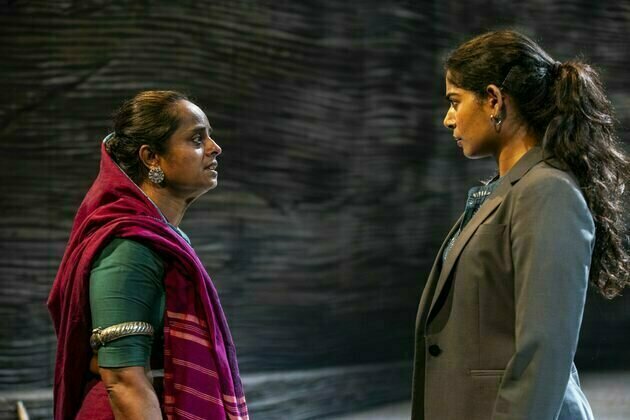Move FM Australian News

S. Shakthidharan’s ambitious play The Wrong Gods is a profound critique of progress and modernity
May 12, 2025S. Shakthidharan is one of Australian theatre’s most prominent writers and directors. His Counting and Cracking (2019) and The Jungle and the Sea (2022) received critical acclaim and toured internationally.
These plays focused on armed conflict and displacement in Tamil Eelam, Sri Lanka. Shakthidharan’s new play shifts settings across the Palk Strait to the contemporary struggles of a remote Indian village fending off the ravages of modernity.
The Wrong Gods, directed by Shakthidharan with Hannah Goodwin, is an ambitious play with an all-female and brown cast. It traces the triumphs and tribulations of single mother Nirmala (Nadie Kammallaweera), fighting to protect her family and valley from the “new” world built on the promise of progress.
In an era of multiple crises, the play draws attention to global Indigenous connections to the natural world – in striking contrast to the extractive and capitalist logics of most modern development.
Nirmala is worried as her daughter, Isha (Radhika Mudaliyar), is loosing interest and confidence in Indigenous practices. Nirmala is determined to ensure Isha not only remembers what to do in the valley but understands why.
Isha is a curious girl with a soaring imagination. Her dreams appear wild: she wants to finish school and become a scientist. A few school lessons in the city open Isha to a new world, to “new gods”, unlike the gods she’s used to of the river and her natural surroundings.
When Lakshmi (Vaishnavi Suryaprakash) arrives uninvited, Nirmala and Isha are cautious and weary. But Lakshmi has big plans for the valley. She introduces Nirmala to new farming methods and crop varieties. To sweeten the deal, Lakshmi offers to pay for Isha’s university education.
Nirmala and Isha are both initially doubtful about Lakshmi’s intentions. To mark their differences, Isha points out to Lakshmi she is an upper caste woman from the city whose entire world view is different to hers.
This is the only reference to caste in the play, and its introduction here feels tokenistic. The reference points to longstanding social inequalities in which lower caste groups have been denied greater access to employment, education and cultural capital, but Shakthidharan passes over it too quickly. This aspect of the plot warranted further attention.
Nirmala accepts Lakshmi’s offer. Isha is overwhelmed with joy at the thought of pursuing an education. Armed with enthusiasm and a thirst for “new” knowledge, she immediately departs for the city.
The Wrong Gods speaks to the harms of “saviours” whose actions are masked under the guise of progress and empowerment.
Nirmala and her village are viewed by Lakshmi as backward, vulnerable and in need of protection. Lakshmi is cast in a paternalist role: she sees her intervention not only as justified economically, but as the morally correct thing to do.
Lakshmi’s words – however promising and life changing they sound – reproduce elite and exclusionary ideas that ignore ways of living that have survived thousands of years.
After several years, Isha returns to the valley as the scientist for the organisation her mother has been mobilising against. With Lakshmi by her side, Isha tells her mother the dam project will flood the valley and displace the farmers. Nirmala is devastated and furious.
After a few tense moments that see Nirmala and Isha locked in an aruval (machete variety) battle, they realise Lakshmi had known about this outcome from the beginning. This realisation is far too late.
Nirmala decides to stay in the valley and fight – even if it means dying. She tells her daughter to return to the city to inform people about their plight and prevent the further depletion of native lands and waterways.
The Wrong Gods is a critique of progress and modernity, and Shakthidharan carefully strikes the right balance between the personal, structural and political.
As Nirmala’s protest actions grow stronger, she must face the reality her daughter is trying to negotiate the needs of two worlds. The interactions between characters and their competing views moves seamlessly across the unfolding scenes, while the audience gets a clearer sense of the entanglements of the challenges playing out in Nirmala and Isha’s lives.
Costumes by Keerthi Subramanyam, who also designed the set, contribute to the play’s critique of progress. Nirmala wears a saree and carries a small purse for food. While Lakshmi wears a churidar set during her first meeting when she is trying to woo favour, she wears a suit on her second visit. Like Lakshmi, Isha returns to the valley wearing a power suit, evoking a sense of authority and upward economic mobility.
The Wrong Gods grapples with the more-than-human worlds at stake amid multiple crises. Through his play, Shakthidharan suggests we should begin addressing the growing needs of our planet by overcoming structural challenges. Doing so may prevent us from reaching solutions which do not displace people or deplete natural resources. Brilliant acting by the cast makes clear the profound emotions of bearing witness to an environmental destruction that is entirely preventable.
We must prioritise and embed local knowledges to address some of the biggest challenges facing us today. Failure to do so will only worsen both man-made and natural crises – and there will be no gods, right or wrong, to save us.
The Wrong Gods is at Belvior Theatre, Sydney, until May 31, then Melbourne Theatre Company from June 6 to July 12.


